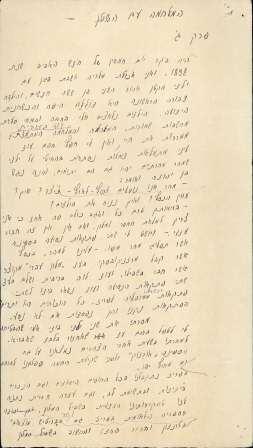Merely 19 years old, Hemda Ben Yehuda barely spoke a few words in Hebrew when she arrived in Palestine. In a few months she learned the language and continued the mission her sister had left unfinished – being Eliezer's partner in founding the first Hebrew family in the modern age that would speak only Hebrew. She took an active role in her husband's endeavors and managed the project of the first Hebrew dictionary. She wrote articles and short stories that appeared in her husband's journals, and with time, became a writer in her own right. She published nine books – novels, memoirs and collections of short stories - and throughout her life remained active in the field of journalism.
War With The Devil
 The book "War With The Devil" is one of two manuscripts by Hemda Ben Yehuda, that were prepared for print but never published. It is not known exactly when it was written, but at least part of it was written after Ben Yehuda's death in 1922. The book is a memoir of Hemda's life with Ben Yehuda and mainly tells the story of their combined effort to produce the Hebrew dictionary. The picture that emerges is one of material hardship but also of immense commitment to the goal.
The book "War With The Devil" is one of two manuscripts by Hemda Ben Yehuda, that were prepared for print but never published. It is not known exactly when it was written, but at least part of it was written after Ben Yehuda's death in 1922. The book is a memoir of Hemda's life with Ben Yehuda and mainly tells the story of their combined effort to produce the Hebrew dictionary. The picture that emerges is one of material hardship but also of immense commitment to the goal.
About life with her husband, Hemda writes: "Ben Yehuda always tries to make his work desk wider and his days longer, to sleep less. Without rest and relaxation. He even limits the amount he reads and asks me to read the newspapers and new books and give him a short report of world events. We still take our daily walks out of the city early in the mornings and after sunset, but even then we decide things, and make plans for tomorrow, the next day, months, and sometimes years ahead. After that, what remains is simply to turn plans into actions and realize the dreams, so that we will not blame ourselves for being lazy or wasting time. "The dictionary must be finished" – these words should gleam in letters of fire and guide us wherever we go. And then, salvation will come. The means for printing it will present themselves. Surely! Could it be any other way?"
The book also provides a glimpse into life in Jerusalem during the end of the Ottoman era. In a chapter titled "Military Regime", Ben Yehuda describes life in the city during World War I: "In 1915, six months into the war, Jerusalem is under military rule. On Mount Scopus, at the Augusta Victoria, the residence of Jamal Pasha, most of the large buildings have been confiscated… and Bek Pasha, the German marshal in Turkish uniform, resides in the large Russian Hospice, opposite the Russian Court.
It was said that even Jamal Pasha submits to his every word, and in the meantime he is in the position of advisor: he decides who will hang, who will face a firing squad, and who will be exiled. Food is scarce, there are no newspapers, and news of the victories of the Allied forces travel by word of mouth. The bastions of the Central Powers are collapsing. In a day or two they will take Egypt, and hushed rumors have begun to circulate regarding a British warship docked in the port of Jaffa. And as if the English have already demanded that Jamal Pasha hand over Jerusalem, Bek Pasha has said: "Let them come and claim it, we cannot deliver it by mail…"